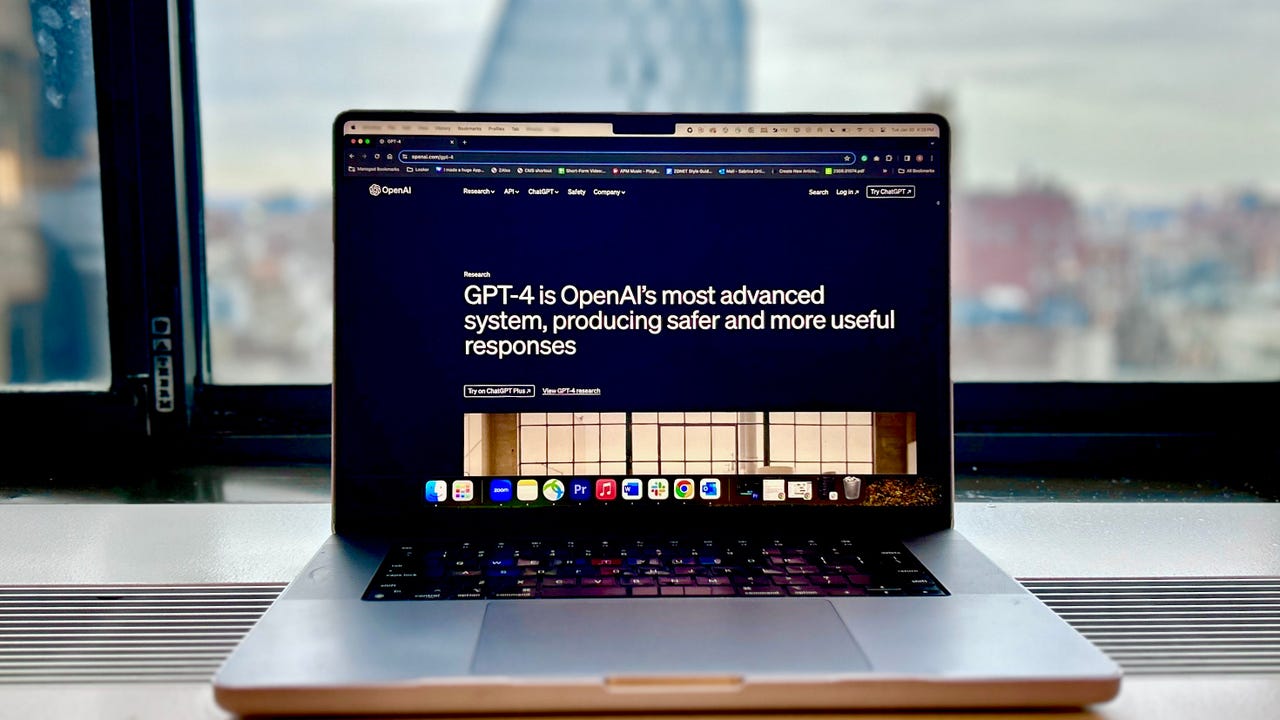
































OpenAI's claim to fame has been its AI chatbot, ChatGPT, which has become a household name. According to a recent Pew Research Center survey, about six in ten adults in the US are familiar with ChatGPT. However, how much do you know about the large language model underlying the chatbot?
The last three letters in ChatGPT's namesake aren't just a catchy part of the name but rather stand for Generative Pre-trained Transformer (GPT), a family of large language models created by OpenAI that uses deep learning to generate human-like, conversational text.
Also: I'm taking AI image courses for free on Udemy with this little trick - and you can too
These GPTs are used in AI chatbots because of their natural language processing abilities to both understand users' text inputs and generate conversational outputs.
OpenAI's standard version of ChatGPT relies on GPT-3.5 to power its chatbot. However, ChatGPT Plus leverages GPT-4, a more advanced version of OpenAI's language model systems. Other chatbots not created by OpenAI also leverage GPT LLMs, such as Microsoft Copilot, which uses GPT-4.
GPT-3.5 is an improved version of GPT-3, capable of understanding and outputting natural language prompts as well as generating code. It is probably the most popular GPT model since it has been found in OpenAI's free version of ChatGPT since its launch.
Also: The best AI chatbots
It reigned supreme as the most advanced AI model until GPT-4 was launched in March.
GPT-3.5 is found in the free version of ChatGPT, and, as a result, is free to access.
GPT-3.5 Turbo is a family model that is a more polished version of GPT-3.5 and is available for developer purchase through an OpenAI API. It can do tasks such as understanding the context of a prompt better and generate higher quality outputs.
Also: Microsoft Copilot vs. Copilot Pro: Is the subscription fee worth it?
Some models include gpt-3.5-turbo-1106, gpt-3.5-turbo, gpt-3.5-turbo-16k among others. The differences between each are the content windows and slight updates, which developers can select from to meet their needs best.
GPT-4 was unveiled by OpenAI on March 14, 2023, nearly four months after the company launched ChatGPT to the public at the end of November 2022.
Also: How to use ChatGPT Plus: From web browsing to plugins
The LLM is the most advanced version of OpenAI's language model systems that the company has launched to date. Its previous version, GPT 3.5, powered the company's wildly popular ChatGPT chatbot when it launched in November 2022.
Since GPT-4 is a large multimodal model (emphasis on multimodal), it is able to accept both text and image inputs and output human-like text.
Also: The best AI image generators
For example, with GPT-4, you could upload a worksheet, and it will be able to scan it and output responses to the questions. It could also read a graph you upload and make calculations based on the data presented.
The intellectual capabilities are also more improved in this model, outperforming GPT-3.5 in a series of simulated benchmark exams, as seen in the chart below.
You can access GPT-4 with a subscription to ChatGPT Plus, which guarantees subscribers access to the language model at the price of$20 per month. Before taking the plunge, it is worth keeping in mind that even with ChatGPT Plus, GPT-4 has a limit of 40 messages every 3 hours.
Also: ChatGPT vs ChatGPT Plus: Is it worth the subscription fee?
There is also a free way to access GPT-4, and it's by using Microsoft Copilot.
Copilot is Microsoft's AI chatbot, formerly known as Bing Chat. It runs on OpenAI's most advanced LLM -- GPT-4. It can be accessed via its standalone website or within the Bing web browser.
Also: What is Copilot (formerly Bing Chat)? Here's everything you need to know
The chatbot's popularity stems from the fact that it has many of the same abilities as ChatGPT Plus, such as access to the internet, multimodal prompts, and sources, without the$20 per month subscription.
ChatGPT is powered by GPT-3.5, which limits the chatbot to text input and output.
The main difference between the models is that because GPT-4 is multimodal, it can use image inputs in addition to text, whereas GPT-3.5 can only process text inputs.
Also: How does ChatGPT work?
The distinction between GPT-3.5 and GPT-4 will be "subtle" in casual conversation, according to OpenAI. However, the new model will be more capable in terms of reliability, creativity, and even intelligence as seen by the higher performance on benchmark exams above.
Yes, GPT-4 is prone to similar limitations as previous GPT models. OpenAI even says that this model is, "not fully reliable (it 'hallucinates' facts and makes reasoning errors)."
Also: ChatGPT Plus users can now add relevant GPTs to their chats - here's how
Despite the warning, OpenAI says GPT-4 hallucinates less often than previous models with GPT-4 scoring 40% higher than GPT-3.5 in an internal adversarial factuality evaluation. The chart is included below.
GPT-4 Turbo is the most latest model that OpenAI has to date. "It's more capable, has an updated knowledge cutoff of April 2023, and introduces a 128k context window (the equivalent of 300 pages of text in a single prompt)," says OpenAI. It is cheaper than GPT-4 and can only be accessed via an API.
Also: How to write better ChatGPT prompts in 5 steps
Another highlight of the model is that it can support image-to-text, known as GPT-4 Turbo with Vision, which is available to all developers who have access to GPT-4. OpenAI recently gave a status update on the highly anticipated model, which will be OpenAI's most advanced model yet, sharing that it plans to launch the model for general availability in the coming months.
There APIs available for all of these GPTs.
 Hot Tags :
Artificial Intelligence
Innovation
Hot Tags :
Artificial Intelligence
Innovation